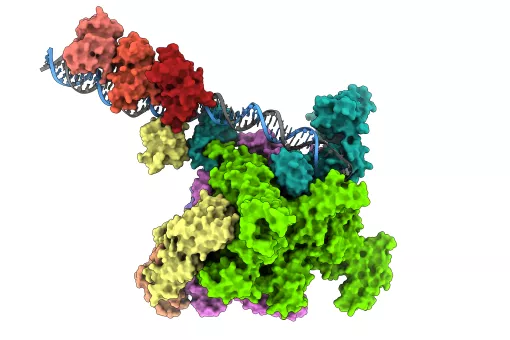Researchers at IRB Barcelona participate in a study headed by IDIBAPS that sheds light on the molecular causes of obesity.
The control of hunger and body weight is governed by the central nervous system, and the region called the hypothalamus plays a crucial role. In normal conditions, the hormone leptin suppresses appetite and reduces body weight by activating the POMC neurons of the hypothalamus.
In obesity there is leptin resistance and this hormone loses its capacity to exert its effects on appetite and weight. The neurobiological causes of this alteration are among the main enigmas in the field of obesity research.
This study describes a molecular mechanism in POMC neurons that explains how leptin resistance comes about and how appetite control becomes disrupted.
A study that appears on the cover of the latest issue of the journal Cell reveals the molecular mechanism that plays a key role in obesity, one of the main epidemics of the first world. Headed by Marc Claret at IDIBAPS, the study describes the key role of the protein Mitofusin-2 in the deactivation of leptin, the hormone responsible for hunger control. This discovery reveals Mitofusin-2 as a possible therapeutic target to combat the leptin resistance found in obese subjects. David Sebastián and Ignacio Castrillón, researchers in Antonio Zorzano’s Heterogenic Diseases Lab at IRB Barcelona, have contributed to this study.
It is well known that the hormone leptin plays a key role in regulating hunger signals in the brain. When we have eaten enough food, this molecule, which is secreted by adipose tissue, suppresses appetite. Many obese people are resistant to the effects of leptin despite having large amount of it in their blood, but the molecular cause of this resistance is still unknown.
The study describes the key role of Mitofusin-2 in POMC neurons
Previous studies had reported that hypothalmic POMC neurons resistant to the effects of leptin, which inhibits the desire to eat, show endoplasmic reticulum stress. The endoplasmic reticulum is a cell organelle responsible, among other activities, for the formation and maturation of proteins encoded in the genome and their distribution inside or outside the cell. When this organelle does not work properly, proteins are not well formed and accumulate, thus interfering with some cellular functions. The study demonstrates how endoplasmic reticulum stress is preceded by a physical separation between the endoplasmic reticulum and mitochondria.
Mitochondria are cellular organelles related to energy generation and a focus of interest in research on pathologies such as hepatic fibrosis and neurodegenerative diseases. Mitochondria are numerous inside cells and are often attached to the endoplasmic reticulum through Mitofusin-2 protein. When the mice investigated in this study consumed a high fat diet, the level of Mitofusin-2 in POMC neurons decreased. Consequently, the endoplasmic reticulum and mitochondria separated, causing stress in the endoplasmic reticulum and the emergence of leptin resistance.
To better understand the role of Mitofusin-2 in the development of leptin resistance and obesity, the researchers generated transgenic mice lacking Mitofusin-2 in POMC neurons. These animals eat more, gain weight due to excessive accumulation of fat, and have altered satiety systems and energy expenditure. The cause of these disorders is the presence of stress in the endoplasmic reticulum of POMC neurons, which prevents the release of a neuropeptide that suppresses appetite. When the stress in the endoplasmic reticulum is reversed through drug treatment, these changes are corrected and mice recover normal behavior.
Thus, this study published in Cell shows that a diet rich in fat alters appetite regulation mechanisms through its effects on the protein Mitofusin-2 of the hypothalamic POMC neurons. This discovery explains for the first time a molecular mechanism relating endoplasmic reticulum stress, resistance to leptin, and deregulation of appetite and body weight.
Some of the experiments have been performed in collaboration with the group headed by Dr. Antonio Zorzano, a Mitufosin-2 expert at the Institute for Research in Biomedicine (IRB Barcelona). The IRB Barcelona researchers generated experimental tools, described the metabolic characteristics of the mice, and contributed to describing the molecular mechanism that involves Mitofusin-2.
The study was partially funded by the RecerCaixa Program of the Obra Social "la Caixa"
Reference article:
Mitofusin-2 in POMC neurons connects ER stress with leptin resistance and energy imbalance.
Marc Schneeberger, Marcelo O Dietrich, David Sebastián, Mónica Imbernón, Carlos Castaño, Ainhoa García, Yaiza Esteban, Alba Gonzalez-Franquesa, Ignacio Castrillón Rodríguez, Analía Bortolozzi, Pablo M Garcia-Roves, Ramon Gomis, Ruben Nogueiras, Tamas L Horvath, Antonio Zorzano and Marc Claret.
Cell, Volume 155, Issue 1, 172-187, 26 September 2013. 10.1016/j.cell.2013.09.003
Related articles:
About IRB Barcelona
The Institute for Research in Biomedicine (IRB Barcelona) pursues a society free of disease. To this end, it conducts multidisciplinary research of excellence to cure cancer and other diseases linked to ageing. It establishes technology transfer agreements with the pharmaceutical industry and major hospitals to bring research results closer to society, and organises a range of science outreach activities to engage the public in an open dialogue. IRB Barcelona is an international centre that hosts 400 researchers and more than 30 nationalities. Recognised as a Severo Ochoa Centre of Excellence since 2011, IRB Barcelona is a CERCA centre and member of the Barcelona Institute of Science and Technology (BIST).







